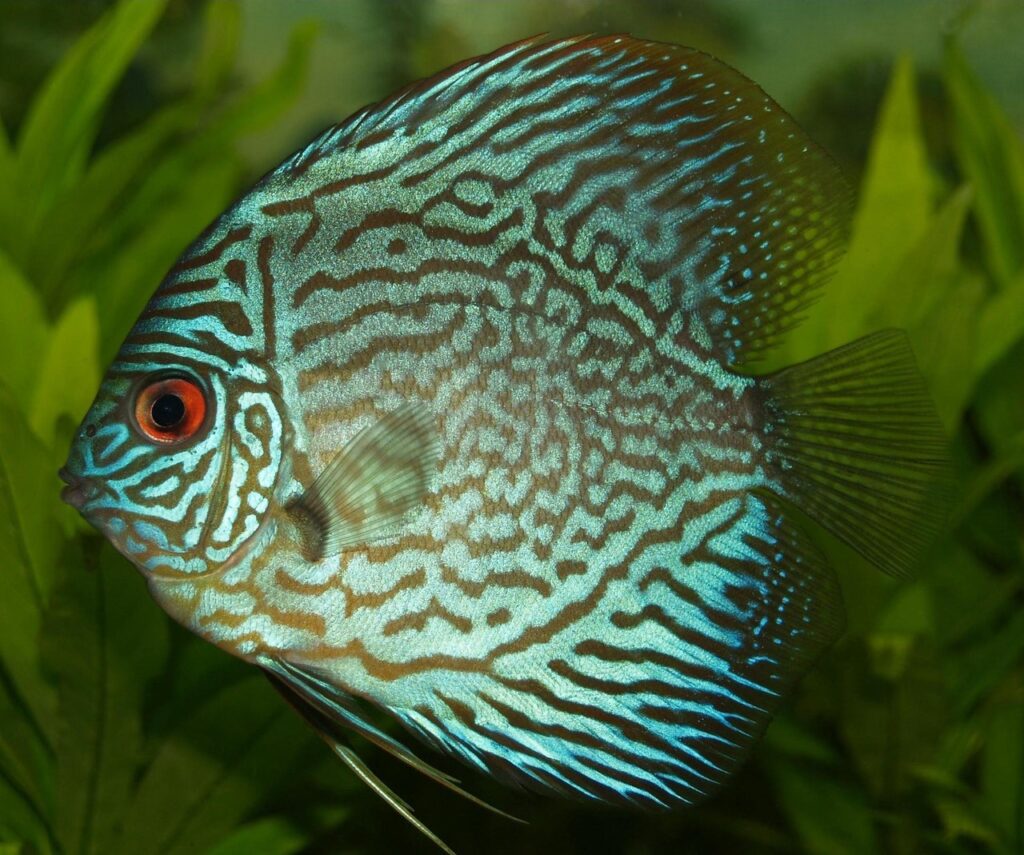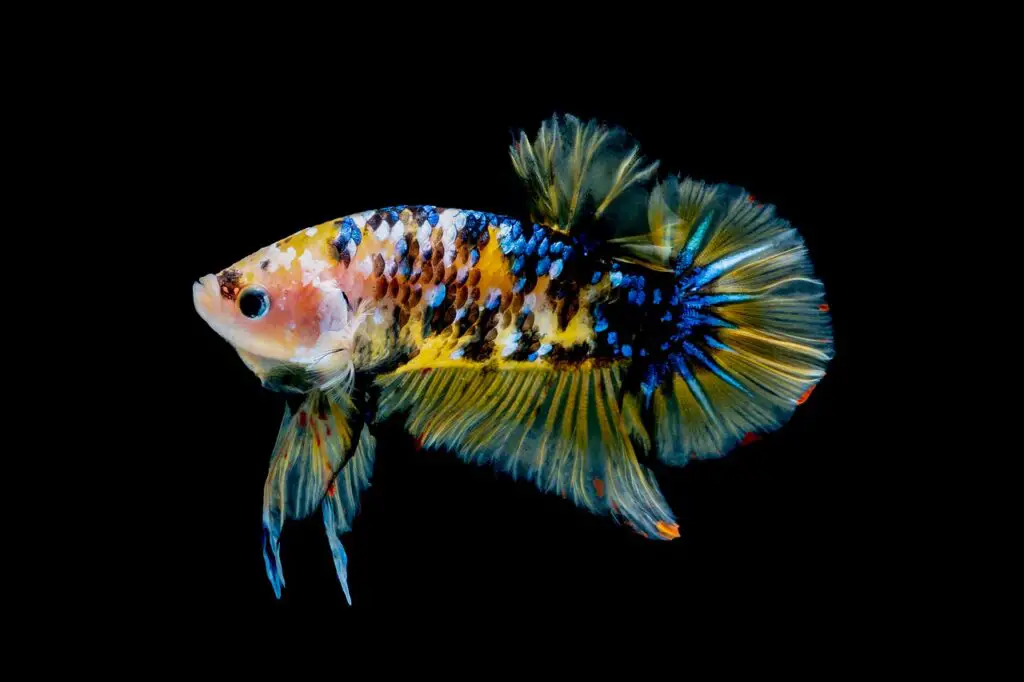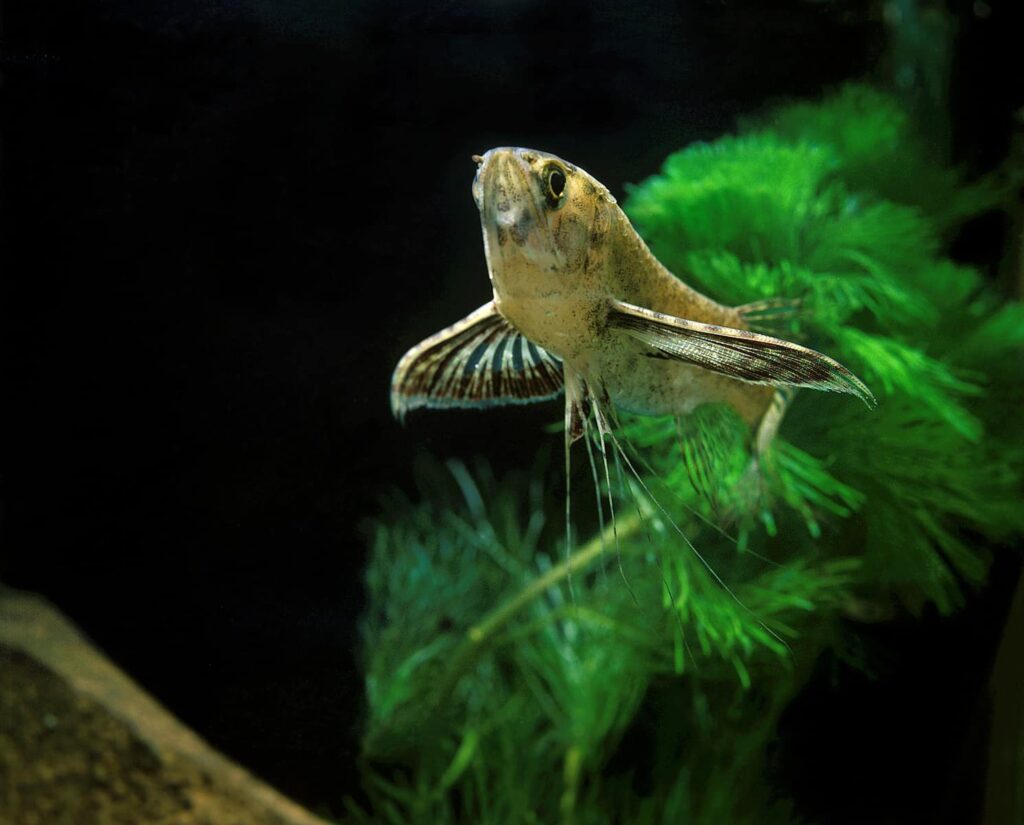The discus fish, or symphysodon, is one of the brightest and most vibrant fish you can bring to your home aquarium! This stunning freshwater aquarium fish comes in variety of different colours and looks, and it’s perhaps one of the most common sights in tanks across the world. It’s a commonly kept cichlid.
Some discus fish are rarer than others, meaning the price you pay may vary from seller to seller. However, in this guide, we are going to be taking a look at how you can take care of discus fish on your own, and what you can expect from them once you bring them into your own tank.

Are you thinking of getting discus fish for your freshwater tank? Make sure to read our full guide before you invest any money, and before you go ahead and buy any tools or equipment!
A discus fish can be a lot of work at times, but they are really worth it! These wonderful aquatic companions will really help to liven up any freshwater tank.
How Do You Take Care of Discus Fish?
Discus fish need precise care, which means you are going to need to make sure you host them at the right temperature.
Ideally, the temperature in your freshwater tank should be around 82.F to 88.F, and you should have a water pH between 6 and 7. These are ideal conditions for discus. Make any drastic changes, however, and they may harm your new tank mates, so be very careful.
Discus like softer sediment on the whole. They are used to Amazonian conditions, meaning the best idea is to try and emulate this as much as possible. However, providing the sediment isn’t too hard, and that the tank water is warm enough to keep them healthy, you will be fine.
Discus fish can react badly to stress, meaning that you must keep your tank levels and feeding absolutely precise. Otherwise, your fish are likely to fall ill.
Taking care of discus fish can be tricky, but as mentioned, it’s a very rewarding process. There may be no other freshwater aquarium fish that looks this bright and colourful! They have a nice temperament, too, meaning providing you meet their needs, you shouldn’t get much trouble out of them.
The golden rule is to build a routine – clean their tanks out at least weekly, and always measure the water temperature. They are also very sensitive to even slight changes in the water balance. Vigilance is key!
What Food do Discus Fish Eat?
Discus fish are omnivorous, which means they eat anything, but they tend to drift towards algae the most.
Discus in the Amazon, for example, will normally hunt down dropped food or bits of algae they can easily nibble at. However, they are also known for enjoying the odd insect and crustacean in their diets.
Therefore, it is a really good idea to vary their diets. Try feeding them on algae and tropical flakes, or even live food. The mosquito larvae, believe it or not, is a healthy treat that discus fish love.
Discus fish will need careful feeding as part of their precise routine. You should make sure to feed them for a five minute period every day. However, it’s very important that you clear up any bits of food they leave behind, too, as this might affect the water quality.
Discus fish aren’t likely to be picky, but they can get fairly dominant if there are more than a few males around. Be careful to ensure that no fish are missing out thanks to the pecking order.
What Size Tank Do You Need for Discus Fish?
You should ideally give a school of discus fish a tank that is at least 50 gallons, however, they like very big tanks.

Discus fish will school around in groups of at least five. The more room you give them, the better. In fact, many experts believe that you should be providing at least seven gallons per discus. 50 gallons should only be used as the absolute minimum.
The bigger the tank, the less likely it is that your discus will become susceptible to various changes in the water. Therefore, it’s in your best interests as well as theirs!
Can You Keep a Single Discus Fish?
Yes, you can keep a single discus fish, though it is not always recommended.
Just as other household pets love the company of other animals, a discus is going to love being able to swim around with others of its kind. A single discus fish is likely to be very happy providing you care for it properly. However, they can get lonely.
Therefore, for the happiest fish possible, we would always recommend that you look to bring a school of discus into your tank, rather than just one or two. We understand that people want to be cautious if they are trying new pets.

However, the difference in care between one and five discus, for example, really isn’t remarkable. They will still need the same tank changes and the same food routines. The extra benefits are that your fish will be happier when sociable, and you’ll also have even more great-looking fish to show off! It’s a win-win scenario.
Do Discus Fish Really Need Daily Water Changes?
Discus fish need frequent water changes, you can change your discus’ water once a week for them to be healthy.
There is no need for you to change their water every day unless you really want to. In some cases, this may be necessary if you have a very small tank, or if you are concerned that your fish are at risk of balance problems.
However, we would generally advise that you change your discus’ water at least once a week. This really will vary from owner to owner. You may ask some people when they change theirs, and they may advise three times a week, to two.
There are some cases where you may need to specially change discus’ water once a day. This, for example, will occur when you are treating your fish for a medical condition, or if you are breeding particularly young discus. In these cases, the more frequent the change in water, the better.
The best thing to do if you are unsure if a water change will benefit your fish is to keep an eye on their health and activity after a change. If their vitality increases post-change, then it’s probably a good thing.
However, do keep in mind that stress, again, really can impact badly on the poor discus. Therefore, moving them in and out of water constantly might not be too good for them! It’s important to find your own balance.
Do Discus Like Moving Water?
No, discus do not like moving water, and prefer still waters instead.
This is all to do with the fact that they, traditionally, thrive in slower waters out in the wild. The discus is a fairly timid and placid fish which can – once again – get easily stressed out. What’s more, it is very hard to raise discus young if your waters are fast and choppy.
Therefore, your freshwater aquarium is going to need a filter that keeps things nice and steady. Try and choose a tank filter that is best suited to the conditions that discus love, and to not overpower them.
How Big Do Discus Get?
Discus fish can grow to be 10 inches long, which is quite large for a freshwater aquarium fish.
As they can grow to such as size, it is all the better an idea to look for as large a tank as possible. Not only will this help them to adapt to water balance, but it will also mean that you have plenty of space to host schools of them.

Not all discus will grow to the same size, however, but do be prepared that if you have a discus of around five inches in length, it may be able to grow to double this providing you have the right conditions for them.
The more your discus grow, the better you are doing, so a sizable discus fish is never really much to worry about. But again – try and account for at least seven gallons of water per fish, as this should give them enough space to grow and swim around in.
How to Stop Discus Fish Bullying
Discus fish can bully each other as they establish a pecking order, and one of the best ways to stop this is to change how you feed them.
Depending on who becomes ‘top dog’ in the tank, you may find that one fish starts bullying the others around or stealing food. The answer to this is not to remove the bullying fish at all, but to perhaps change up their feeding routine.
Discus fish can get to know where food is placed if you just tip it into the same area of the tank again and again. Therefore, it’s really important to try and spread it out. This will prevent a bullying fish from guarding and hoarding food. If it’s all over the tank, they can’t be in all places at once.
What’s more, you might consider swapping to a larger tank, or even adding more discus fish. This will, mathematically, make it harder for bully fish to target the same victims again and again.
Do Discus Get Along with Angelfish?
Yes, discus and angelfish can live together, but both can be very territorial.
This means that you will need to be careful if you are thinking of bringing these two species together. They tend to like the same conditions and are peaceful on the surface. However, they can get aggressive with one another if they are feeding or breeding.
A discus generally won’t cause a fight but can get possessive. Angelfish, on the whole, are even more prone to this behaviour.
Therefore, it’s a good idea to make sure that they have plenty of different hiding places and that – yet again – you have a big enough tank!
Just like people, fish need plenty of space, and even personal space, to go elsewhere away from others if they need to. Therefore, if your discus is feeling pretty stressed out by an angelfish, they can go and chill out somewhere without any kind of intrusion or aggression. The same, in reverse, goes for the angelfish.
Otherwise, these fish really do go well together. You just need to make sure you are able to keep an eye on their behaviour from day to day.
What Fish Can Live with Discus?
Angelfish, ember tetras, gourami and neon tetras all make great tank mates for discus.
The fact is, the discus can be quite a shy and retiring sort. Therefore, a variety of different fish in a smallish tank might stress them out. It’s therefore a good idea to get a big tank and to gently introduce new friends.
Fish such as Bolivian Rams and Gourami are great as they thrive in similar environments and won’t lock horns with your discus. They tend to be of similar size, too, so there’s no threat of getting eaten.
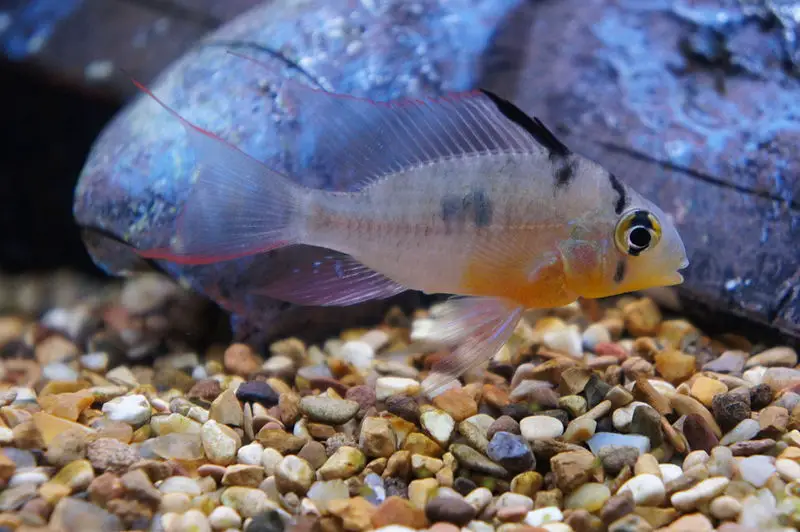
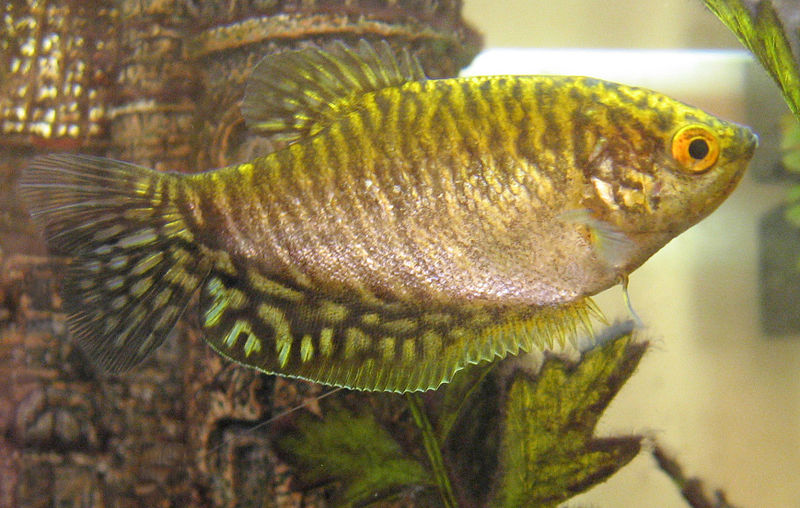
Avoid introducing any fish which are aggressive by nature by default. Plenty of fish can be territorial, but the discus is pretty sensitive, meaning that they are easily bullied.
However, matching up your discus with other fish might just be down to the personality of your discus. Get to know them first and start thinking about introducing tank mates!
Conclusion
Discus fish are great fun to keep but will require a lot of TLC.
However, this is all the better for your tank. They are sweet, lovable fish with lots of colour and personality, and while you will need to change their tank up at least once a week, it is all the better to ensure that they are healthy and happy.
Be careful introducing new fish to their water, and, as always, go for a bigger tank rather than a smaller one wherever possible.

